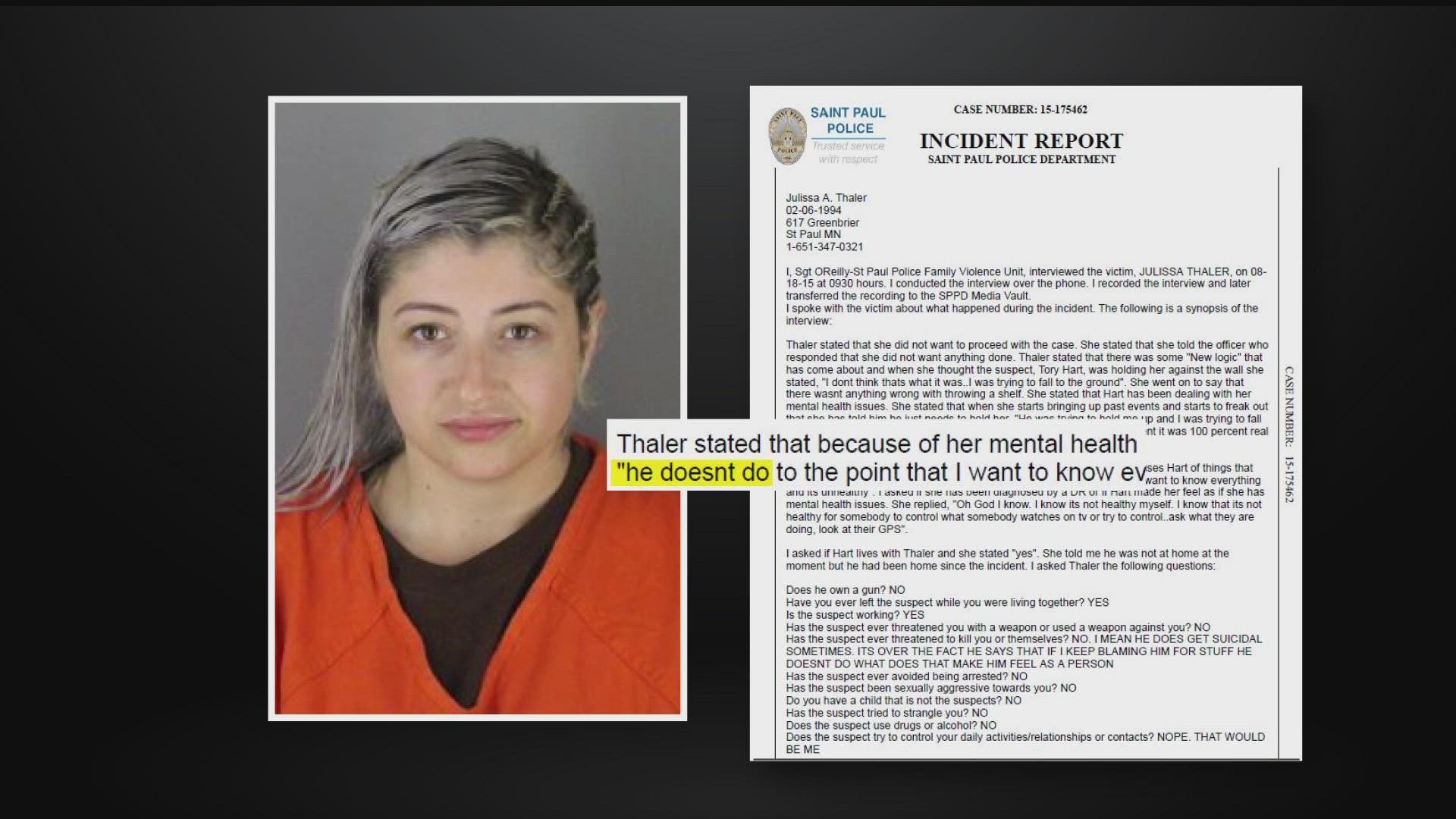DAKOTA COUNTY, Minn. — Ten days before police found 6-year-old Eli Hart’s body in the trunk of a vehicle driven by his mother on May 20, a judge closed a child protection case for the boy – despite serious red flags raised by court workers about his mother’s care for her son, case records show.
Among their concerns:
- That the boy’s mother, Julissa Thaler, had a history of severe mental illness, yet had stopped seeing her therapist, raising concerns about the boy’s own mental health and well-being.
- She repeatedly had unstable housing, including being forced to move for violating her leases.
- She failed to complete a parenting education program for missing too many classes.
- She failed to remain law abiding, including facing a charge for stealing drugs the year before.
- She failed to sign releases to allow social workers access to Eli’s medical records.
- Most concerning to the social workers: Thaler was apparently doing anything she could to sabotage the boy’s relationship with his father, whom the child’s court-appointed guardian said “appears to be a stabilizing force in Eli’s life.” Thaler had made repeated accusations against him, none of which the boy’s social workers could verify.
So why did a Dakota County judge close the child protection case?
He was following the recommendations made by the very social workers who raised those red flags, who wanted the case to proceed in family court, records show.
The boy’s father, Tory Hart, filed for full custody of the boy in March, but the judge in that case made it inactive as long as the child protection case remained open.
Under state law, the only way for the custody case to move forward was to close the protection case.
In Minnesota, child protection cases take precedence over almost any other case regarding a child’s wellbeing, said Joanna Woolman, a Mitchell Hamline School of Law professor.
“From a policy perspective … our legislators have said they think it should take precedent over some of these types of cases that may not be as urgent and may not be speaking as directly to child safety,” she said.
In a report to the court in the child protection case, the guardian wrote that although she “continues to have ongoing concerns regarding Eli’s emotional and mental well-being … this reporter does not currently have concerns about Eli’s physical well-being in either parent’s care.”
At the same time, the guardian expressed concern that Thaler was “doing everything thing she can to prohibit contact between Eli and his father.” Even so, she agreed the case should proceed in family court.
So, when the child protection judge closed that case, it allowed Eli’s father to again try to get custody of his son. But Eli was also left in the sole custody of his mother, with no one from the courts watching over the two.
Thaler is now charged with second-degree murder after prosecutors accuse her of shooting her son up to nine times, according to the criminal charge.
The criminal complaint says Thaler purchased a shotgun on March 17 – less than a week after Eli’s father filed for custody of his son.
And days after the court closed the child protection case – clearing the way for the father’s custody case to continue – Thaler is accused of killing the boy.
Child protection history
Court records show Dakota County took Eli into temporary custody in January 2021 after getting a report that Thaler was hospitalized, hearing voices telling her to kill herself and having paranoid delusions. Child protection was also concerned that Eli was being neglected.
He was placed into foster care for the next year as she worked on a case plan to reunify with her son. She was allowed to begin a trial home visit with him in December 2021.
Even then, social workers had continued concerns about her behavior, as well as how she disparaged Eli’s father.
They could find no evidence to support her accusations that Tory Hart used drugs and was abusive; when they asked her to provide proof of hospitalizations she claimed to have gone through, for example, she couldn’t produce a single record.
Court records show also social workers discovered an earlier police report which said Thaler admitted that some of her allegations against Hart “were not true and likely due to her own mental health diagnosis.”
Hart, meanwhile, tested negative during all of his random drug tests, and followed his case plan. Social workers wrote they had no concerns about his parenting.
Hart told Eli’s social workers that he was worried that Thaler would cut off his communication with their son once he was reunified with her, according to the case files.
But he was told to take his worries elsewhere.
“Mr. Hart has been advised to handle this situation within the family court setting,” Eli’s social worker wrote in the boy’s final report before the judge closed the child protection case.
Asked for comment, a Dakota County spokesman replied: "Our deepest sympathy goes out to family and friends impacted by this tragic loss. Due to privacy laws we cannot comment further."
The program administrator for the State Guardian Ad Litem board said, "We are very saddened by this tragic event. Our deepest sympathies go out to family, friends and all of our communities impacted by this loss. Due to privacy laws, we are unable to comment further."
Thaler is currently being held on $2 million bail. Her next court hearing is scheduled for June 21.

